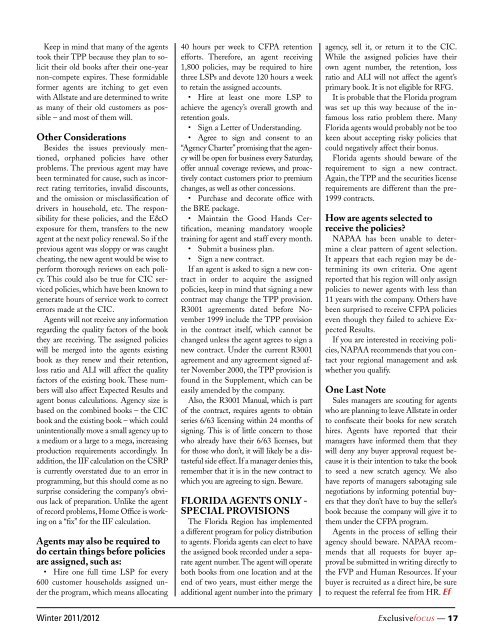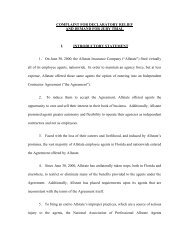who is the redheaded stepchild of allstate's Distribution system?
who is the redheaded stepchild of allstate's Distribution system?
who is the redheaded stepchild of allstate's Distribution system?
Create successful ePaper yourself
Turn your PDF publications into a flip-book with our unique Google optimized e-Paper software.
Keep in mind that many <strong>of</strong> <strong>the</strong> agents<br />
took <strong>the</strong>ir TPP because <strong>the</strong>y plan to solicit<br />
<strong>the</strong>ir old books after <strong>the</strong>ir one-year<br />
non-compete expires. These formidable<br />
former agents are itching to get even<br />
with Allstate and are determined to write<br />
as many <strong>of</strong> <strong>the</strong>ir old customers as possible<br />
– and most <strong>of</strong> <strong>the</strong>m will.<br />
O<strong>the</strong>r Considerations<br />
Besides <strong>the</strong> <strong>is</strong>sues previously mentioned,<br />
orphaned policies have o<strong>the</strong>r<br />
problems. The previous agent may have<br />
been terminated for cause, such as incorrect<br />
rating territories, invalid d<strong>is</strong>counts,<br />
and <strong>the</strong> om<strong>is</strong>sion or m<strong>is</strong>classification <strong>of</strong><br />
drivers in household, etc. The responsibility<br />
for <strong>the</strong>se policies, and <strong>the</strong> E&O<br />
exposure for <strong>the</strong>m, transfers to <strong>the</strong> new<br />
agent at <strong>the</strong> next policy renewal. So if <strong>the</strong><br />
previous agent was sloppy or was caught<br />
cheating, <strong>the</strong> new agent would be w<strong>is</strong>e to<br />
perform thorough reviews on each policy.<br />
Th<strong>is</strong> could also be true for CIC serviced<br />
policies, which have been known to<br />
generate hours <strong>of</strong> service work to correct<br />
errors made at <strong>the</strong> CIC.<br />
Agents will not receive any information<br />
regarding <strong>the</strong> quality factors <strong>of</strong> <strong>the</strong> book<br />
<strong>the</strong>y are receiving. The assigned policies<br />
will be merged into <strong>the</strong> agents ex<strong>is</strong>ting<br />
book as <strong>the</strong>y renew and <strong>the</strong>ir retention,<br />
loss ratio and ALI will affect <strong>the</strong> quality<br />
factors <strong>of</strong> <strong>the</strong> ex<strong>is</strong>ting book. These numbers<br />
will also affect Expected Results and<br />
agent bonus calculations. Agency size <strong>is</strong><br />
based on <strong>the</strong> combined books – <strong>the</strong> CIC<br />
book and <strong>the</strong> ex<strong>is</strong>ting book – which could<br />
unintentionally move a small agency up to<br />
a medium or a large to a mega, increasing<br />
production requirements accordingly. In<br />
addition, <strong>the</strong> IIF calculation on <strong>the</strong> CSRP<br />
<strong>is</strong> currently overstated due to an error in<br />
programming, but th<strong>is</strong> should come as no<br />
surpr<strong>is</strong>e considering <strong>the</strong> company’s obvious<br />
lack <strong>of</strong> preparation. Unlike <strong>the</strong> agent<br />
<strong>of</strong> record problems, Home Office <strong>is</strong> working<br />
on a “fix” for <strong>the</strong> IIF calculation.<br />
Agents may also be required to<br />
do certain things before policies<br />
are assigned, such as:<br />
• Hire one full time LSP for every<br />
600 customer households assigned under<br />
<strong>the</strong> program, which means allocating<br />
40 hours per week to CFPA retention<br />
efforts. Therefore, an agent receiving<br />
1,800 policies, may be required to hire<br />
three LSPs and devote 120 hours a week<br />
to retain <strong>the</strong> assigned accounts.<br />
• Hire at least one more LSP to<br />
achieve <strong>the</strong> agency’s overall growth and<br />
retention goals.<br />
• Sign a Letter <strong>of</strong> Understanding.<br />
• Agree to sign and consent to an<br />
“Agency Charter” prom<strong>is</strong>ing that <strong>the</strong> agency<br />
will be open for business every Saturday,<br />
<strong>of</strong>fer annual coverage reviews, and proactively<br />
contact customers prior to premium<br />
changes, as well as o<strong>the</strong>r concessions.<br />
• Purchase and decorate <strong>of</strong>fice with<br />
<strong>the</strong> BRE package.<br />
• Maintain <strong>the</strong> Good Hands Certification,<br />
meaning mandatory woople<br />
training for agent and staff every month.<br />
• Submit a business plan.<br />
• Sign a new contract.<br />
If an agent <strong>is</strong> asked to sign a new contract<br />
in order to acquire <strong>the</strong> assigned<br />
policies, keep in mind that signing a new<br />
contract may change <strong>the</strong> TPP prov<strong>is</strong>ion.<br />
R3001 agreements dated before November<br />
1999 include <strong>the</strong> TPP prov<strong>is</strong>ion<br />
in <strong>the</strong> contract itself, which cannot be<br />
changed unless <strong>the</strong> agent agrees to sign a<br />
new contract. Under <strong>the</strong> current R3001<br />
agreement and any agreement signed after<br />
November 2000, <strong>the</strong> TPP prov<strong>is</strong>ion <strong>is</strong><br />
found in <strong>the</strong> Supplement, which can be<br />
easily amended by <strong>the</strong> company.<br />
Also, <strong>the</strong> R3001 Manual, which <strong>is</strong> part<br />
<strong>of</strong> <strong>the</strong> contract, requires agents to obtain<br />
series 6/63 licensing within 24 months <strong>of</strong><br />
signing. Th<strong>is</strong> <strong>is</strong> <strong>of</strong> little concern to those<br />
<strong>who</strong> already have <strong>the</strong>ir 6/63 licenses, but<br />
for those <strong>who</strong> don’t, it will likely be a d<strong>is</strong>tasteful<br />
side effect. If a manager denies th<strong>is</strong>,<br />
remember that it <strong>is</strong> in <strong>the</strong> new contract to<br />
which you are agreeing to sign. Beware.<br />
FLORIDA AGENTS ONLY -<br />
SPECIAL PROVISIONS<br />
The Florida Region has implemented<br />
a different program for policy d<strong>is</strong>tribution<br />
to agents. Florida agents can elect to have<br />
<strong>the</strong> assigned book recorded under a separate<br />
agent number. The agent will operate<br />
both books from one location and at <strong>the</strong><br />
end <strong>of</strong> two years, must ei<strong>the</strong>r merge <strong>the</strong><br />
additional agent number into <strong>the</strong> primary<br />
agency, sell it, or return it to <strong>the</strong> CIC.<br />
While <strong>the</strong> assigned policies have <strong>the</strong>ir<br />
own agent number, <strong>the</strong> retention, loss<br />
ratio and ALI will not affect <strong>the</strong> agent’s<br />
primary book. It <strong>is</strong> not eligible for RFG.<br />
It <strong>is</strong> probable that <strong>the</strong> Florida program<br />
was set up th<strong>is</strong> way because <strong>of</strong> <strong>the</strong> infamous<br />
loss ratio problem <strong>the</strong>re. Many<br />
Florida agents would probably not be too<br />
keen about accepting r<strong>is</strong>ky policies that<br />
could negatively affect <strong>the</strong>ir bonus.<br />
Florida agents should beware <strong>of</strong> <strong>the</strong><br />
requirement to sign a new contract.<br />
Again, <strong>the</strong> TPP and <strong>the</strong> securities license<br />
requirements are different than <strong>the</strong> pre-<br />
1999 contracts.<br />
How are agents selected to<br />
receive <strong>the</strong> policies<br />
NAPAA has been unable to determine<br />
a clear pattern <strong>of</strong> agent selection.<br />
It appears that each region may be determining<br />
its own criteria. One agent<br />
reported that h<strong>is</strong> region will only assign<br />
policies to newer agents with less than<br />
11 years with <strong>the</strong> company. O<strong>the</strong>rs have<br />
been surpr<strong>is</strong>ed to receive CFPA policies<br />
even though <strong>the</strong>y failed to achieve Expected<br />
Results.<br />
If you are interested in receiving policies,<br />
NAPAA recommends that you contact<br />
your regional management and ask<br />
whe<strong>the</strong>r you qualify.<br />
One Last Note<br />
Sales managers are scouting for agents<br />
<strong>who</strong> are planning to leave Allstate in order<br />
to conf<strong>is</strong>cate <strong>the</strong>ir books for new scratch<br />
hires. Agents have reported that <strong>the</strong>ir<br />
managers have informed <strong>the</strong>m that <strong>the</strong>y<br />
will deny any buyer approval request because<br />
it <strong>is</strong> <strong>the</strong>ir intention to take <strong>the</strong> book<br />
to seed a new scratch agency. We also<br />
have reports <strong>of</strong> managers sabotaging sale<br />
negotiations by informing potential buyers<br />
that <strong>the</strong>y don’t have to buy <strong>the</strong> seller’s<br />
book because <strong>the</strong> company will give it to<br />
<strong>the</strong>m under <strong>the</strong> CFPA program.<br />
Agents in <strong>the</strong> process <strong>of</strong> selling <strong>the</strong>ir<br />
agency should beware. NAPAA recommends<br />
that all requests for buyer approval<br />
be submitted in writing directly to<br />
<strong>the</strong> FVP and Human Resources. If your<br />
buyer <strong>is</strong> recruited as a direct hire, be sure<br />
to request <strong>the</strong> referral fee from HR. Ef<br />
Winter 2011/2012 Exclusivefocus — 17
















